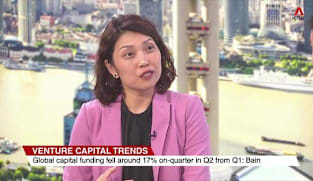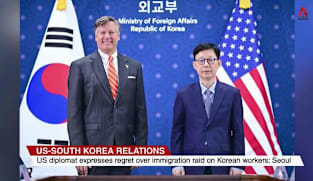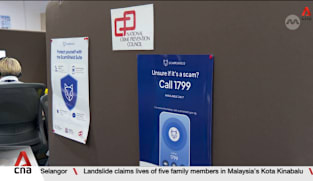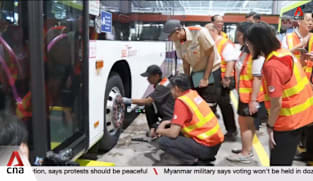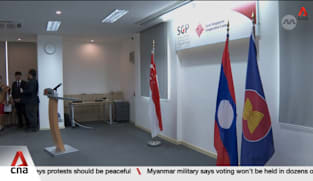Tan See Leng on Energy Transition Measures and Other Amendments Bill
Power rationing is only a “last resort” and will not be activated lightly but it is one part of Singapore’s preparation for an increasingly uncertain world, said Second Minister for Trade and Industry Tan See Leng. “I hope we will never have to use it,” he said in Parliament on Monday (Sep 9), as he outlined the key proposals of the Energy Transition Measures and Other Amendments Bill to strengthen Singapore’s regulatory framework for energy markets and infrastructure. Under the Bill, the Energy Market Authority (EMA) will have the power to implement power rationing with the approval of the Minister for Trade and Industry. When power rationing becomes necessary, as much advance notice will be provided as possible so that households and businesses can take actions to minimise disruptions to their activities. Priority will be given to services that are critical to Singapore's security, economic and social needs. The Government will ensure that residents continue to have access to power for their daily needs even as it prioritises other critical facilities, such as hospitals. Dr Tan stressed the need to be prepared for the unexpected where Singapore might need to adopt power rationing to maintain power system stability. Power rationing will be lifted once these measures are no longer required for system stability. Dr Tan noted that businesses are understandably concerned about the impact. He said the Bill provides businesses with protection from liability if compliance with EMA’s direction on power rationing results in a breach of their contracted obligations. Another key proposal of the Bill is the Future Energy Fund (FEF) for projects which may involve high upfront costs, and significant commercial, technological and geopolitical risks. It provides catalytic funding to improve the commercial viability of strategic projects undertaken by private sector players, statutory bodies and other entities. For example, it provides financial support to mitigate the commercial risks associated with developing Singapore's first-ever hydrogen terminal. Dr Tan said the Government has begun saving up now for these infrastructure investments to reduce the burden on future generations. With an initial injection of S$5 billion in FY2024, this will put Singapore in a stronger position to make critical investments to secure its multi-decade energy transition, said Dr Tan. The Government will make further top-ups to the fund when its fiscal space allows. Dr Tan stressed that the FEF will focus on supporting capital expenditures and will not be used to subsidise fuel costs and recurrent expenditures. Dr Tan said amidst an evolving and uncertain global energy landscape, Singapore will always seek to strike an optimal balance between energy security, sustainability and cost competitiveness, as well as ensure that its energy system remains resilient, adaptable and aligned with its decarbonisation plans.
Power rationing is only a “last resort” and will not be activated lightly but it is one part of Singapore’s preparation for an increasingly uncertain world, said Second Minister for Trade and Industry Tan See Leng. “I hope we will never have to use it,” he said in Parliament on Monday (Sep 9), as he outlined the key proposals of the Energy Transition Measures and Other Amendments Bill to strengthen Singapore’s regulatory framework for energy markets and infrastructure. Under the Bill, the Energy Market Authority (EMA) will have the power to implement power rationing with the approval of the Minister for Trade and Industry. When power rationing becomes necessary, as much advance notice will be provided as possible so that households and businesses can take actions to minimise disruptions to their activities. Priority will be given to services that are critical to Singapore's security, economic and social needs. The Government will ensure that residents continue to have access to power for their daily needs even as it prioritises other critical facilities, such as hospitals. Dr Tan stressed the need to be prepared for the unexpected where Singapore might need to adopt power rationing to maintain power system stability. Power rationing will be lifted once these measures are no longer required for system stability. Dr Tan noted that businesses are understandably concerned about the impact. He said the Bill provides businesses with protection from liability if compliance with EMA’s direction on power rationing results in a breach of their contracted obligations. Another key proposal of the Bill is the Future Energy Fund (FEF) for projects which may involve high upfront costs, and significant commercial, technological and geopolitical risks. It provides catalytic funding to improve the commercial viability of strategic projects undertaken by private sector players, statutory bodies and other entities. For example, it provides financial support to mitigate the commercial risks associated with developing Singapore's first-ever hydrogen terminal. Dr Tan said the Government has begun saving up now for these infrastructure investments to reduce the burden on future generations. With an initial injection of S$5 billion in FY2024, this will put Singapore in a stronger position to make critical investments to secure its multi-decade energy transition, said Dr Tan. The Government will make further top-ups to the fund when its fiscal space allows. Dr Tan stressed that the FEF will focus on supporting capital expenditures and will not be used to subsidise fuel costs and recurrent expenditures. Dr Tan said amidst an evolving and uncertain global energy landscape, Singapore will always seek to strike an optimal balance between energy security, sustainability and cost competitiveness, as well as ensure that its energy system remains resilient, adaptable and aligned with its decarbonisation plans.









